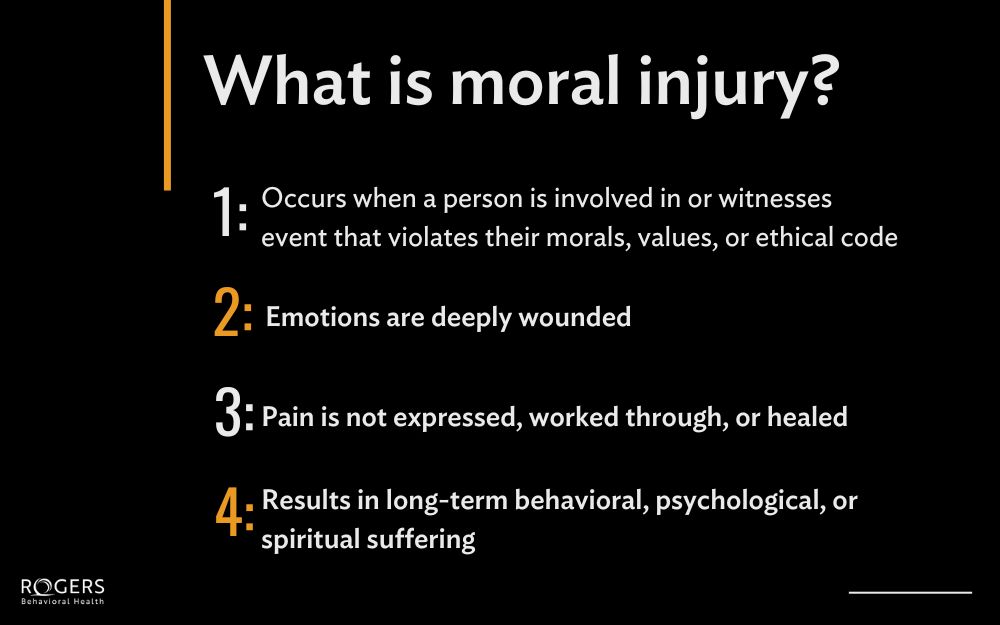By Rae Anne Ho Fung, PhD, LP, executive director of clinical integration for Rogers Behavioral Health (top) and Jennifer Parra Nelsen, LPC, clinical services supervisor for Rogers in Brown Deer (bottom)
What is moral injury?![HoFung823.jpg]()
Let’s begin with moral pain. Moral pain is a common human emotion that occurs when someone is involved in or witnesses an event that violates their morals, values, or ethical code of conduct. Moral pain can lead to moral injury when the person doesn’t allow themselves to express, work through, and heal, resulting in long-lasting behavioral, psychological, or spiritual suffering.
What are the factors that contribute to moral injury?![JenniferParaNelsen_blog.JPG]()
As children, we have an idea of who we’re going to be and the actions that will lead us to becoming that person. Moral injury happens when we’re in a situation where we act against that ideal, see others doing so, or are harmed by others behaving in a way that violates our beliefs and we don’t take the time to heal.
A person’s values and beliefs are informed and shaped by society and the culture they’re living in. When moral injury occurs, a person’s emotions are deeply wounded affecting the way they perceive themselves and their place within that community and culture.
What are examples of moral injury?
Anyone can experience a distressing circumstance that can lead to moral injury, like a child who is abused by a parent. The child knows that the parent is supposed to love and care for them unconditionally and they’re a victim of someone behaving in a way that violates society’s values and morals.
Most often we see moral injury in first responders, Veterans, and military service members.
A classic example is a solider having to choose between taking the life of a civilian or seeing their fellow team members become victims of war. Allowing anyone to be hurt could cause someone to feel moral pain. In that moment, there’s no way to behave in a way that aligns with that person’s moral and ethical code. However, the decision to take the life of the civilian makes sense within the context of war as the service member’s values and morals are informed by the military and the wartime situation. When the service member returns home and is in different cultural norms, they could think about that moment in a different way, like, “My grandmother taught me never to hurt anyone. I must be a bad person.” Or maybe the service member returns to church and they’re starting to process their experiences and the discrepancy between what they did “over there” and how they’re trying to live now.
But it doesn’t have to be a wartime situation. Moral injury can happen when a service member is sexually assaulted by another service member. Besides violating personal safety, the assault goes against the culture of camaraderie and trust that is inherent within the military.
A military service member who doesn’t deploy can also experience moral injury. Maybe they know someone who was in Iraq during the fall of Fallujah. They hold the value of protecting their friend or loved one, and they can’t reconcile that they weren’t in battle with them. This is commonly referred to as survivor’s guilt and is actually a type of moral injury.
What does a person who has moral injury experience?
People who suffer moral injury can experience:
- Guilt
- Shame
- Disgust
- Self-loathing
- Anger
- Depression
- Anxiety
Moral injury changes how people behave because they’re trying to avoid the emotional pain of an event. Oftentimes that may look like avoidance of family, friends, and activities that they would otherwise engage in. Moral injury also causes a person to question and reevaluate themselves, which results in feelings of not being a good person, being unlovable, or undeserving of happiness.
PTSD and moral injury
While both moral injury and PTSD are stress related, PTSD is a fear-based reaction in which a person avoids situations where they may feel as though their lives are at risk. Moral injury is a shame-based reaction, where avoidance is tied to a person’s shame, sense of worthiness, and negative self-beliefs.
How can a person support a loved one with moral injury?
A person can support someone with moral injury by:
- First and foremost, listening.
- Asking if they’re okay.
- Sharing any concerns you have about changes you may be seeing.
- Holding space for them.
It’s really important that people know that they don’t need to have the answers. A person can still be there for someone even if they’re unsure of what to do.
What would you say to someone who has moral injury?
We want people to know that what they’re feeling is absolutely normal and it’s important to talk about it. They can reach out to a vet center, a peer support group, or a trusted friend or loved one. They don’t have to talk about everything. They can start by saying something like, “Hey, I’m feeling off. Can I sit with you for a while?” Maybe it will take a while before they can share everything that’s going on inside and that’s okay
Just like someone wouldn’t feel stigma if they broke their foot, they shouldn’t feel stigma because they feel broken inside.
Those suffering are not alone. There is hope, and they can recover.
How Rogers can help
Rogers is here to help with compassionate treatment when you’re ready. Call 800-767-4411 for a free, confidential screening.


